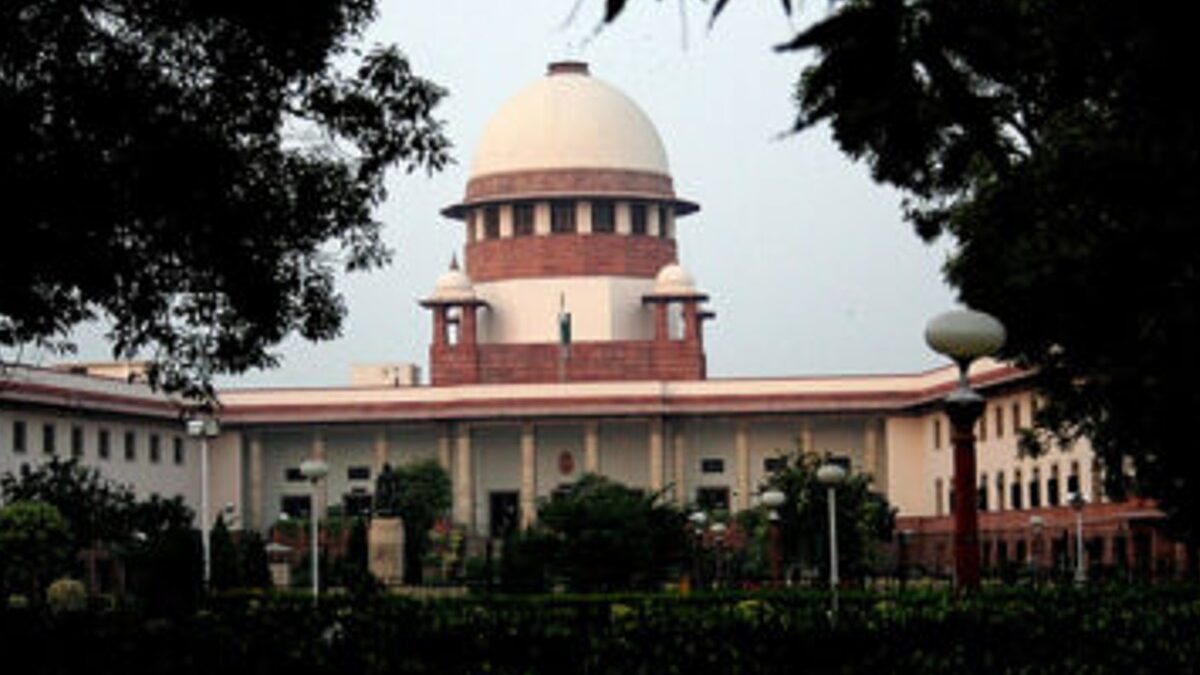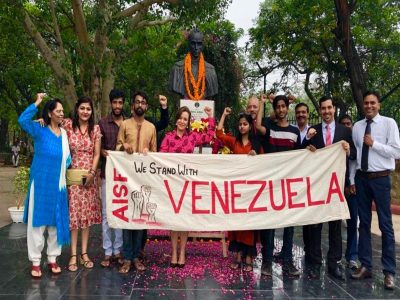The Supreme Court on Tuesday unanimously ruled against same-sex marriage, saying there was “no unqualified right” to marriage with the exception of those that are recognised by law. The apex court, however, said it is within the scope of Parliament to modify the law, particularly, the Special Marriage Act, to validate the same-sex union.
A constitution bench of five judges, led by Chief Justice D Y Chandrachud, delivered four separate verdicts on a batch of 21 petitions seeking legal recognition for same-sex marriage.
The LGBTQIA++ persons, who had won a major legal battle in 2018 in the Supreme Court which decriminalised consensual gay sex, had moved the top court seeking validation of same-sex marriage and consequential reliefs such as rights to adoption, enrolment as parents in schools, opening of bank accounts and availing succession and insurance benefits.
LGBTQIA++ stands for lesbian, gay, bisexual, transgender, queer, questioning, intersex, pansexual, two-spirit, asexual and ally persons.
Patriot answers the most asked questions regarding the much-awaited verdict.
Are marriages between same-sex couples legal?
No, the Supreme Court unanimously ruled against legalising such marriages, saying it cannot enter the legislative domain and accord legal recognition to same-sex marriages.
Are same-sex couples allowed ‘civil unions’?
With a 3:2 majority, the Supreme Court refused to accord recognition to ‘civil unions’ of same-sex couples.
The majority view of Justice S Ravindra Bhat, Justice Hima Kohli and Justice Narasimha prevailed, according to which such unions cannot be recognised under the law. However, Justice Bhat clarified that these findings should not be read as to preclude queer persons from celebrating their commitment to each other or their relationship in whichever way they wish within the social realm.
However, CJI Chandrachud and Justices Sanjay Kishan Kaul opined that same-sex couples are entitled to recognise their relationships as civil unions and claim relevant benefits
Is it legal for same-sex couples to adopt children?
The SC bench, with a 3:2 majority, refused to allow same-sex couples to adopt children.
Justice Ravindra Bhat, Justice Hima Kohli and Justice PS Narasimha said the law does not recognise the right of same-sex couples to adopt children.
However, CJI Chandrachud and Justice Kaul said same-sex, unmarried couples must have a right to adopt children
Is it possible for couples of the same gender to live together?
The court unanimously stated that same-sex couples have a right to choose their partners and cohabit with them.
What is the status of the Special Marriage Act, the law which was challenged in court?
The court was unanimous in stating that the Special Marriage Act is not unconstitutional on the ground that it discriminates against same-sex couples. The court, however, observed it is within Parliament’s ambit to change the law for validating the same-sex union.
The bench also recorded the assurance by Solicitor General Tushar Mehta that the Centre will constitute a committee chaired by the Cabinet Secretary for the purpose of defining and elucidating the scope of the entitlements of queer couples who are in union.
What about transgenders? Do they have the right to marry?
The top court stated that all persons, irrespective of their gender, have the right to marry as long as it is within the confines of the law. It held that transgender people in heterosexual relationships have the freedom and entitlement to marry under existing law including personal laws which regulate marriage.
Petitioners down but not out, they say there are positive takeaways too
Supriyo Chakraborty, a petitioner in the case, expressed his disappointment, stating, “We are deeply disappointed by today’s judgement. Although the court acknowledged the right of queer people to form relationships, they fell short of granting legal recognition”.
“On a personal level, we take pride in fighting this battle. Despite the loss, this case sparked numerous dinner table conversations. We remain hopeful for full marriage equality one day,” Chakraborty said.
“We had hoped the court would direct the government to take necessary steps. Now, our hopes turn to the citizens of India. Democracy must fulfill the promise of dignity in the constitution,” said Uday Raj Anand, another petitioner, speaking to Patriot.
“It’s true that it a very sad day. The country that does not accept me the same way as it accepts cis-gender heterosexual couples. My decision to leave the country stands vindicated. However, there are some silver linings. One thing I am sure of is that we will not be backing down and will march forward towards a more equal society,” said Saattvic, an economist based in Canada and one of the petitioners.
His petition highlighted the gay brain drain issue and how it impacts the country’s economy. Saattvic had earlier said that he might reconsider his decision to leave the country if the verdict is favourable.
He added that the next steps may not be a one-way approach by the community. “It’s too soon to say what are the next steps. But I think there will be people who will approach the high courts, mobilise the communities, and work with the parliamentarians. One thing I am sure of is that it is not the end. It’s a fight and there are setbacks in it. We are not going to stop and continue to march forward. We won’t give up.”
Senior Advocate Geeta Luthra, who represented many petitioners in the case, said, “As usual, I felt that all the judges have given extremely wonderful and erudite judgement”.
The lawyer lauded the CJI for recognising the same rights for same-sex couples as heterosexual couples. However, she said, the court could have interpreted the Constitution in an expansive manner for the recognition of same-sex marriage.
“I think it was possible. We could have interpreted our Constitution in an expansive manner. So normally, courts strike down some aspects of the statute to make it a part of Articles 14, 15, or bring in a fundamental right. But it is not that it is not possible. However, that is not the view of the majority and we have to respect it,” she said.
Luthra added that we have to keep hoping that equal rights will become a reality for same-sex people, queer individuals, and “those who also need to have a recognition of their fundamental rights.”
“Let’s see what the future holds. Let the minority view become someday the majority view,” she added.
Activist Anjali Gopalan said that the judgement is problematic in the sense that it says that parliament should do whatever it has to do and there is no timeline for when it will happen.
“In the judgement, they said that states can definitely do something about the issue…However, suppose we reach the state court and it does something and it gets challenged by someone else and goes to the Supreme Court, then they will say Parliament should do something about it. So, right now it is a very helpless situation.”
Unhappy over the court not giving adoption rights to same-sex couples, Gopalan said, “I think it’s important for us to engage with a larger civil society and work with politicians. It will be a slow and long process but we have to do that.”
Many welcome the verdict
Solicitor General Tushar Mehta, the government’s key lawyer in the case, hailed the Supreme Court judgement. “I wholeheartedly welcome the judgement. I am happy that my stand has been accepted…All four judgements have taken the jurisprudence of our nation and the intellectual exercise which went into writing the judgments to a next level”.
BJP Rajya Sabha MP and senior advocate Mahesh Jethmalani commented on the judgement, highlighting that the Court recognised the matter falls within the domain of Parliament.
He said that the queer community can find encouragement in the Court’s decision to establish a high-powered committee, led by the Cabinet Secretary, to promptly examine all aspects of same-sex marriage and provide recommendations based on stakeholder input.
Reacting to the verdict, in a post on X, Congress general secretary Jairam Ramesh said, “On the same sex marriage and related issues we are studying the different and differing judgements delivered in the Supreme Court today and will have a detailed response subsequently.”
“Indian National Congress has always stood with all our citizens to protect their freedoms, choices, liberties and rights. We, as a party of inclusion, firmly believe in non discriminatory processes judicial, social, and political,” Ramesh said.
On the same sex marriage and related issues we are studying the different and differing judgments delivered in the Supreme Court today and will have a detailed response subsequently.
Indian National Congress has always stood with all our citizens to protect their freedoms,…
— Jairam Ramesh (@Jairam_Ramesh) October 17, 2023
All India Majlis-e-Ittehadul Muslimeen chief Asaduddin Owaisi said the Supreme Court had upheld the “principle of parliamentary supremacy”.
#SameSexMarriage
1. SC has upheld the principle of parliamentary supremacy. It is not up to the courts to decide who gets married under what law.
2. My faith and my conscience says that marriage is only between a man and a woman. This is not a question of decriminalisation like…— Asaduddin Owaisi (@asadowaisi) October 17, 2023
“It is not up to the courts to decide who gets married under what law,” he said.
“My faith and my conscience says that marriage is only between a man and a woman. This is not a question of decriminalisation like in the case of 377, it is about the recognition of marriage. It is correct that the state cannot extend it to anyone and everyone,” Owaisi said.
He raised concerns over the bench’s ruling that transgender persons in heterosexual relationships have a right to marry as per the existing statutory laws or personal laws.
“This is not a correct interpretation as far as Islam is concerned, as Islam does not recognise marriage between two biological males or two biological females,” Owaisi said.
The Rashtriya Swayamsevak Sangh (RSS) expressed support for the Supreme Court’s ruling on same-sex marriage, stating that Parliament should discuss the matter thoroughly and make appropriate decisions. Sunil Ambekar, Akhil Bharatiya Prachar Pramukh of the RSS, emphasised the importance of democratic discussion in addressing related issues.
“The Supreme Court’s decision on same-sex marriage is worth welcoming. Our democratic parliamentary system can seriously discuss all the issues related to this and take appropriate decisions,” Sunil Ambekar said in a post on X.
The Vishva Hindu Parishad supported the Supreme Court’s decision to withhold legal recognition for same-sex marriages and adoption, considering it a positive step.
The organisation expressed satisfaction with the Court’s ruling, stating that the relationship between homosexuals in the form of marriage is not eligible for registration, emphasising that this is not a fundamental right.
They also approved of the decision to deny homosexuals the right to adopt a child.
Maulana Mahmood Asad Madani, President of Jamiat Ulama-i-Hind, welcomed the verdict, emphasising that it reinforces the preservation of the traditional institution of marriage, a fundamental pillar of our society for centuries.
#SupremeCourt Rejects Plea to Legalise #SameSexMarriage#समलैंगिक जोड़ों की शादी का कोई मौलिक अधिकार नहींः #सुप्रीम कोर्ट
– #जमीअत उलमा-ए-हिंद के अध्यक्ष मौलाना #महमूद असद मदनी ने फैसले का स्वागत किया और कहा कि अदालत के फैसले से विवाह की पवित्र व्यवस्था का संरक्षण हुआ
– वरिष्ठ… pic.twitter.com/aHkqxejrph— Jamiat Ulama-i-Hind (@JamiatUlama_in) October 17, 2023
He highlighted the importance of upholding moral and ethical principles that define our cultural identity. Maulana Madani commended the court for maintaining a delicate balance between protecting individual rights and preserving our cultural ethos.





